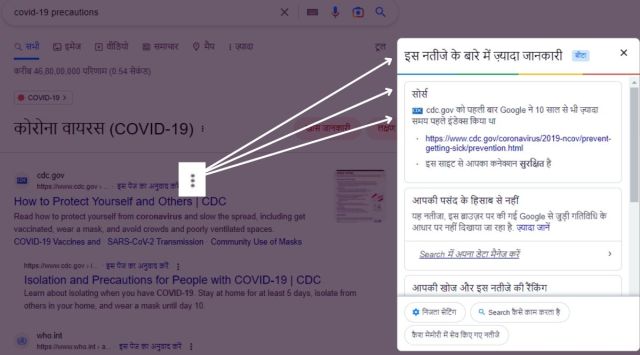Google fights back against misinformation in India, as fake news reaches all-time high
Ahead of International Fact-Checking Day, Google has shared a blog enumerating its efforts towards combating online misinformation.
 The ‘About This Result’ feature offers additional context that will enable users to make more informed decisions about the websites that they want to visit and ascertain what results will be the most useful.
The ‘About This Result’ feature offers additional context that will enable users to make more informed decisions about the websites that they want to visit and ascertain what results will be the most useful. In the age of information, nothing can be more damaging than fake news and misinformation. The advent of the Internet has given individuals and organisations numerous ways to consume and disseminate information. Knowledge sharing is vital, but misinformation masquerading as expert advice online can be detrimental to our collective growth.
Ahead of International Fact-Checking Day which falls on April 2, search giant Google has announced its efforts to fight misinformation in India through its products, programs, and partnerships.
The Alphabet-owned company has stated that its mission is to organise information and make it accessible and useful universally. The company said that it feels a great responsibility to its users who place their trust in it to deliver helpful information. According to Google, trends in misinformation have recorded an all-time high in India in 2023 and this is an indication of the gravity of the issue.
“Google’s mission is to organize the world’s information and make it universally accessible and useful. And when it comes to the internet, we know there’s all kinds of information, and not all of it is reliable or trustworthy. At Google, we feel a great responsibility to our users who place their trust in us to deliver trustworthy, helpful information for their various needs. The scourge of online misinformation runs counter to that mission,” read the opening lines of Google’s blog post.
About This Result feature
In a bid to fight misinformation, Google has introduced the About This Result feature that will let users evaluate the information and understand its source. The feature is available globally and in nine Indian languages.
The feature extends to Hindi, Tamil, Bengali, Marathi, Gujarati, Telugu, Malayalam, Kannada, and Punjabi. With the feature, those searching for information in any of the above languages will see three dots next to most results on the Google Search Results Page. Simply tapping on the dots will open a new box that will offer information about the result, essentially where it is coming from and how Google determined it to be a useful query.
According to Google, the feature offers additional context that will enable users to take more informed decisions about the websites that they want to visit and help them ascertain what results will be the most useful. Google said that similar features across all its products represent its fight against misinformation. In its blog, Google went on to offer some steps for users to take across its products, programs, and partnerships.
Push for information from authoritative sources
For both Search and YouTube, Google is working towards prioritising information from authoritative sources. On YouTube, the Top News section will feature results from authoritative voices including news sources when one proactively looks for news-related topics.
When it comes to crucial developments, the Breaking News shelf will appear directly on the homepage. Moreover, YouTube will offer a wide range of information panels, certain events, and topics including health information along with search results to offer more context.
FactShala
Google said that it is also supporting FactShala, a collaborative and multi-stakeholder media literacy network pioneered by over 250 journalists and experts who run tailored workshops in over 15 languages. Google is partnering with these experts to develop training modules to help users effectively spot disinformation. FactShala will be launching an incubator program to assist media and community organisations in experimenting with new formats to support media literacy. It will also run a campaign for youth and first-time voters in collaboration with 500 colleges.
Supporting quality journalism
Google said that it has been dedicating significant resources to support quality journalism through its Google News Initiative. It is collaborating with a whole new ecosystem to promote quality reporting. The company claimed that since 2016, it has trained over 60,000 journalists and media students on skills needed to debunk online misinformation in India.
Google carried out its training through GNI India Training Network and its Teaching fellows. The training included 1200 workshops in over 15 languages, impacting 1450 newsrooms and 1200 universities.
In 2022, Google rolled out the GNI Fact Check Academy. And, now ahead of key state elections, Google has rolled out the GNI PollCheck, a digital training series to help journalists collate engaging stories.
When it comes to countering malicious actors and protecting users, Google said that it has a range of internal policies that prohibit bad behavior online with policies that cover areas such as misrepresentation, impersonation, or health disinformation; and we enforce these policies proactively.







